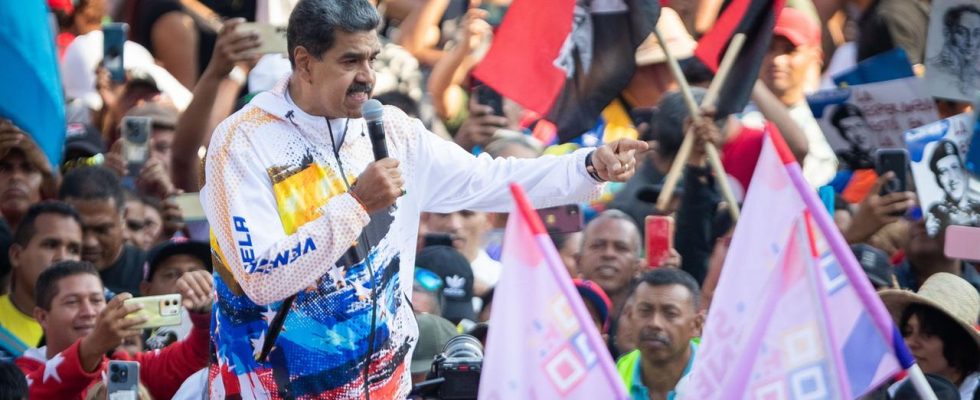Under chaotic and contentious circumstances, Venezuela’s government has scheduled presidential elections for July. Head of State Maduro is running again – and is already ensuring that the opposition probably has no chance.
13 candidates have registered for the presidential elections on July 28th in Venezuela to challenge the authoritarian ruler Nicolás Maduro. The names were read out by the electoral council shortly after the registration deadline at the beginning of the week.
But behind the scenes there is chaos. The largest opposition alliance – Mesa de la Unidad Democrática (PUD) – has not managed to register its preferred candidate. The actually most promising candidate, Maria Corina Machado, was banned from holding public office for 15 years because of alleged irregularities during her time as a member of parliament.
The 80-year-old Corina Yoris, a renowned university professor, was actually supposed to take her place. But she too was unable to complete her registration with the electoral authority – due to a computer glitch, as it was said.
Corina Yoris should run for the opposition alliance PUD. But she was denied registration.
Opposition leads in polls
At the last moment, the opposition alliance appointed the political scientist González Urrutia. He has stepped in and is intended to serve as a placeholder for the time being, as the parties can exchange their candidates until April 20th. The opposition leader Machado is combative: “We will not allow ourselves to be pushed out.”
Machado had the potential to challenge President Maduro for power. In the past few weeks and months, she has been able to inspire Venezuelans and fill squares and election campaign events. In various surveys she was always clearly ahead. Yoris would have benefited from her, as observers say.
According to the latest survey by the Venezuelan polling institute Datanalisis from early March, only 15.2 percent of respondents said they identified with the ruling party, while 35.7 percent said they supported the opposition. Maduro apparently feels threatened. Only candidates who could not pose a threat to him were admitted.
The last elections were not recognized
After the death of his predecessor Hugo Chávez, Maduro was initially sworn in as interim president in March 2013. In an early election he was elected head of state with a narrow majority.
In 2018 he was confirmed in office in a controversial election. Because of allegations of manipulation, the opposition did not recognize the result – as did dozens of countries, including the USA and EU countries.
Massive repression
Shortly before the upcoming election in July, Maduro’s government is taking increasingly tough action against opposition members. Last week, Machado’s close campaign associates were arrested. In addition, arrest warrants were issued against seven other people from their team, as the public prosecutor’s office announced. The accusation: conspiracy plans to destabilize the country.
Six opposition members seek shelter in the Argentine embassy residence in Caracas. According to the Argentine Foreign Ministry, the building’s electricity was then turned off.
In its latest report, the United Nations mission in Venezuela sharply criticized the authorities. There are two types of repression, explains spokeswoman Martha Valiñas: The voices of the opposition are silenced at all costs. A climate of fear and intimidation is being created that restricts the free exercise of the most fundamental rights.
Hope for change
The left-wing governments in Colombia and Brazil also distanced themselves from Maduro’s socialist regime. They are calling for the implementation of the Barbados Agreement, in which representatives of the government and opposition agreed to free and transparent elections last October.
In view of the repression, the political and economic crisis, the violence and corruption, more than eight million Venezuelans have now turned their backs on their homeland, many with the USA as their destination.
Many of those left behind wanted to vote and thus bring about an early democratic transition, said Venezuelan journalist Liza López: “A large part of the population is hoping for an agreement, a consensus, for a candidate who represents the entire political spectrum within the opposition – it doesn’t matter whether he is right, center or center-left.” It’s all about making the transition as peaceful as possible in order to improve the quality of life for all Venezuelans.
Anne Demmer, ARD Mexico City, tagesschau, March 26, 2024 1:17 p.m

